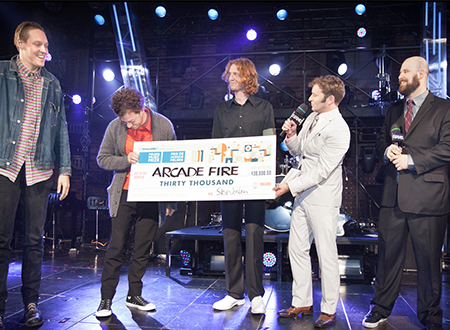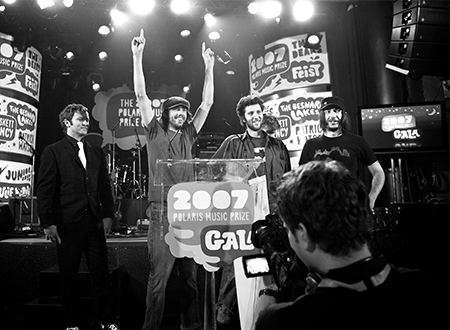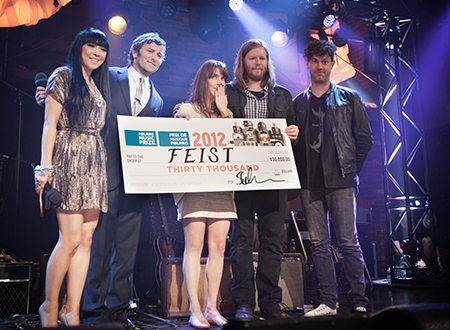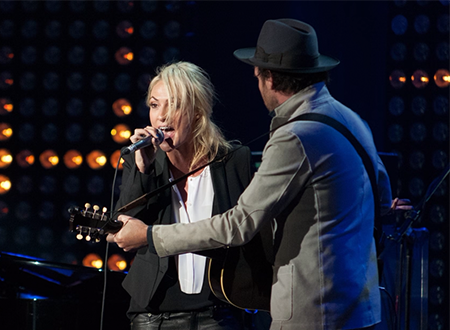The Origins of Polaris Music Prize with Steve Jordan
By Julia Girdharry

To learn about the origins of the Polaris Music Prize, we spoke with its founder, Steve Jordan.
This year’s 2024 Polaris Music Prize Gala was filled with vibrant performances and emotional moments, celebrating Canada’s current and emerging music champions. With last year’s winner, Debby Friday, hosting the show and Jeremy Dutcher taking home their second Polaris Music Prize, it was truly a spectacular evening.
To learn more about how this impactful and exciting event has evolved over the years, we spoke with Steve Jordan, the founder of the Polaris Music Prize. Scroll down to read the full story, straight from the source.
Q: What inspired you to create Polaris Music Prize?
A: The idea for Polaris came from a few different things. I was between jobs after working in A&R (Artist and Repertoire) at Warner Music Canada. There were several artists I was excited about signing, but convincing a major label was tough. Plus, artists themselves were becoming more aware of the realities of major label deals. Bands like Broken Social Scene, Feist, The Dears, Stars, and Metric were just starting to gain attention, but they either weren’t embraced or chose not to work within the Canadian major label system.
After leaving the industry, I still felt there was a lot of energy around Canadian artistry. Later on, bands like Arcade Fire and Wolf Parade came along, part of this wave of unique and exciting music. Around that time, I was also following the UK’s Mercury Prize. When their shortlist came out, I’d go out and buy physical copies of the music. This was the early internet, so you couldn’t just stream or download everything. A lot of the records weren’t available in Canada, and you had to find stores that specialized in imports.
That scarcity doesn’t exist anymore, but back then, it felt like a treasure hunt. I thought, if I was making that much effort to find music, maybe there was a way for Canadian music to be discovered internationally in the same way. I’d also noticed how the Giller Prize boosted book sales and created a lot of buzz for Canadian authors, so all of that led me to the idea of Polaris. At first, I thought, “This idea is too good—someone else must be doing it already.” But when I couldn’t shake it, I realized it was worth pursuing.


Q: How did you get the idea off the ground?
A: With my background in the broadcast and music industries, I had a decent network. My experience in A&R helped me connect with artists and music journalists. I wanted to use the opinions of journalists and music media to create the shortlist, instead of a small jury. From working in major labels, I knew music journalists were open-minded and unbiased. They weren’t officially representing artists but still felt compelled to write about what they liked and didn’t like.
My first exposure to many artists—like Tegan and Sara, The Weakerthans, The Dears, Arcade Fire, and Broken Social Scene—was through music writers. That’s when I thought, “What if we harness the opinions of those who know music best?” Unlike the Mercury Prize or Giller Prize, which use small juries to judge submissions, I wanted the process to come from people deeply immersed in music, like journalists, broadcasters, and media people.
I shared the idea with my network, and it quickly gained support. We formed a not-for-profit with a board of directors to handle funding and ensure that Polaris remained a collective effort.
Q: How did you envision Polaris contributing to the Canadian music scene overall?
A: There wasn’t a grand vision at first. It was more of an experiment to see if people would care. We wanted to capture and build on the artistic energy in Canada and create a sense of community around it, which was missing at the time. Our goal was to give Canadian artists more exposure and international recognition. We kept it simple: exist, raise enough funds each year, and support the artists who were nominated and won.
Part of our vision was to get Canadian artists recognized internationally, but also to bring artists who were known abroad but overlooked in Canada into the spotlight. Those ideas did come true, though I didn’t expect them to. In A&R, most ideas don’t work out, so I was used to thinking, “This might not succeed, but let’s go for it.”


Q: What were some of the early challenges you faced getting Polaris off the ground?
A: One challenge was proving our legitimacy to both artists and funders. Artists quickly saw that Polaris was a genuine effort to highlight compelling music, so they embraced it. Funders, on the other hand, needed to see an audience, which we were able to demonstrate. We focused on attracting sponsors by emphasizing our unique audience, rather than over-promising on viewership numbers.
Our pitch to sponsors was never about reaching millions of people. Instead, we targeted those who appreciated discovering new music—beyond what they might have listened to in high school or university. These were people who might be busy now and not have time to keep up with music blogs like Pitchfork, but still wanted to know what was worth listening to. By keeping our goals modest, we were able to maintain long-term sponsorships without over-promising.
Q: Why was inclusivity across musical genres important to the prize?
A: Inclusivity was crucial from the start. If Polaris was going to represent the best of Canadian music, it had to include francophone artists and jury members. We wanted to reflect the diverse cultural backgrounds contributing to music in Canada. Feedback and criticism were key to staying relevant, such as striving for more balanced gender representation among jury members.
In the early days, there weren’t many BIPOC and Indigenous artists on our radar, but over time, that became a priority. Criticism is a gift—it’s an opportunity to listen and make changes to stay relevant. Music in Canada comes from a wide range of cultural sources, so if we wanted to represent it properly, we had to be open to everything. It’s an ongoing process—never perfect or finished—but essential for maintaining the integrity of the prize.


Q: How did you hear about feedback, and where did most of the Polaris buzz come from?
A: In the early years, this was definitely pre-Instagram, and Twitter wasn’t really active yet. There wasn’t much commercial radio coverage either. Most of the buzz came from campus radio, community radio, alternative press, and the early internet. Pitchfork embraced us early on, which helped establish our legitimacy.
When we eventually moved into social media, we focused primarily on Twitter. I ran the account myself because I felt Twitter needed personality and direct interaction. It was exciting to see people engage and get excited about Canadian music.
Q: Looking back, is there a particular Polaris moment or performance that has defined your experience as the founder?
A: One standout moment was Tanya Tagaq’s performance. It was so extraordinary that it left the audience in awe. The intensity and range of emotions she displayed were unforgettable. That performance perfectly captured what Polaris is all about—highlighting unique, powerful music that resonates deeply with the audience.
To learn more abot the Polaris Music Prize, visit polarismusicprize.ca
Header image by Ro Cemm.